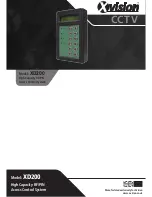
154
CHAPTER 8 LOW-POWER CONTROL CIRCUIT
■
Release of Stop Mode
The low-power consumption control circuit releases the stop mode when a reset is input or an interrupt
occurs. Because oscillation of the operating clock is halted before returning from the stop mode, the low-
power consumption control circuit enters the oscillation stabilization wait state, then releases the stop
mode.
●
Return by a reset
After the stop mode is released by a reset, the oscillation stabilization wait state is set. The reset sequence is
executed after the oscillation stabilization wait time.
Note:
The RST signal must be asserted for at least 100
μ
s + oscillation time of the osci 16 machine
clock cycles in Stop Mode. Refer to the AC Characteristics Section of the data sheet.
●
Return by an interrupt
If an interrupt request of level seven or higher is issued from a peripheral circuit during the stop mode (IL2,
IL1, and IL0 of the interrupt control register (ICR) do not indicate "111
B
"), the low-power consumption
mode control circuit releases the stop mode. The interrupt is then handled as an ordinary interrupt after the
oscillation stabilization wait time of the main clock specified by the WS1 and WS0 bits of the clock
selection register (CKSCR). If the interrupt is accepted according to the setting of the I flag of the condition
code register (CCR), interrupt level mask register (ILM), and interrupt control register (ICR), the CPU
executes the interrupt processing. If the interrupt is not accepted, the CPU executes the instruction
following the instruction specifying the stop mode.
Note:
When interrupt processing is executed, the CPU normally executes the instruction following the
instruction in which switching to the stop mode has been specified. The CPU then proceeds to
interrupt processing. If the switching to the stop mode and acceptance of an external bus hold
request occur at the same time, however, the CPU may proceed to interrupt processing before
executing the next instruction.
Figure 8.5-2 shows the release of the stop mode (external reset).
Summary of Contents for MB90390 Series
Page 2: ......
Page 4: ......
Page 17: ...xiii APPENDIX D List of Interrupt Vectors 690 INDEX 695 ...
Page 18: ...xiv ...
Page 132: ...104 CHAPTER 5 CLOCKS ...
Page 152: ...124 CHAPTER 6 CLOCK MODULATOR ...
Page 210: ...182 CHAPTER 11 TIME BASE TIMER ...
Page 218: ...190 CHAPTER 12 WATCHDOG TIMER ...
Page 264: ...236 CHAPTER 14 16 BIT RELOAD TIMER WITH EVENT COUNT FUNCTION ...
Page 274: ...246 CHAPTER 15 WATCH TIMER ...
Page 306: ...278 CHAPTER 17 DTP EXTERNAL INTERRUPTS ...
Page 338: ...310 CHAPTER 18 8 10 BIT A D CONVERTER ...
Page 364: ...336 CHAPTER 19 UART0 UART1 ...
Page 398: ...370 CHAPTER 20 UART2 UART3 Figure 20 5 2 ORE Set Timing Receive data RDRF ORE ...
Page 432: ...404 CHAPTER 20 UART2 UART3 ...
Page 482: ...454 CHAPTER 22 SERIAL I O ...
Page 560: ...532 CHAPTER 24 STEPPING MOTOR CONTROLLER ...
Page 582: ...554 CHAPTER 27 ROM MIRRORING MODULE ...
Page 632: ...604 CHAPTER 29 EXAMPLES OF SERIAL PROGRAMMING CONNECTION ...
Page 722: ...694 APPENDIX ...
Page 723: ...695 INDEX The index follows on the next page This is listed in alphabetic order ...
Page 740: ......
















































